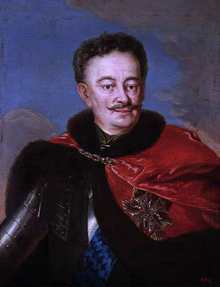Józef Potocki
Józef Potocki (* 1673 in Ivano-Frankiwsk ; † May 19, 1751 in Założce ) was a Polish member of the Szlachta and Grand Hetman of the Polish Crown .
Life
The father was Andrzej Potocki and the mother Anna Rysińska. The Potockis were a famous aristocratic family whose origins lie in the town of Potok in the Krakow Voivodeship.
Józef was considered the richest magnate at the time. He was voivode of the Kiev Voivodeship from 1702 to 1744, Regimentarz generalny of the Polish Crown Army from 1733, Grand Hetman of the Crown from 1735 and Voivode of the Poznan Voivodeship from 1743. He was also castellan of Krakow from 1748 and district administrator of Halytsch , Warsaw, Leżajsk, Kolomyja , Czerwonogród, Sniatyn and Bolemów.
In 1703 he suppressed a peasant revolt led by Semen Palij in Ukraine . He was originally a supporter of King August II of Poland. Due to the hopeless military situation of the Saxons in the Great Northern War against Sweden, he changed sides in 1705 and became a supporter of King Stanislaus I. Leszczyński, who was supported by Sweden .
In the Battle of Kalisch , which the Swedes lost , Potocki led the Polish troops on the right flank. After the battle, Jozef fell into Saxon hands as a prisoner of war. Since August did not want to cancel the Altranstadt peace that had just been concluded, he released all prisoners.
Leszczyński wanted to provide military assistance to the Swedes during their Russian campaign two years later and personally appointed Potocki as commander. About 8,000 horsemen and dragoons and a smaller number of artillery were under his command. Józef was defeated in the Battle of Koniecpol in 1708 by the anti-Swedish supporters of the elected but deposed King of Poland August the Strong, who had been deposed in the Peace of Altranstadt . With the loss of this army, Stanislaus Leszczyński's position in Poland was greatly weakened. He hardly had any military reserves left. After the turn of the war to the disadvantage of the Swedish camp through the lost battle of Poltava , Potocki went into exile in Hungary and Turkey. In 1714 he came back to Poland and together with Theodor Andreas Potocki became the leader of the opposition to the Familia party and the royal court.
In 1733, during the War of the Polish Succession , he again supported Stanislaus I. Leszczyński. He became a Regimentarz the Confederation of Dzików and led the Polish Confederate Army against the Russian and Saxon troops in many battles. In 1735 he recognized August III. as King of Poland, but conspired against him and the royal court, with Turkey, Sweden and Prussia.
literature
- Potocki, 1st Józef . In: Theodor Westrin, Ruben Gustafsson Berg (eds.): Nordisk familjebok konversationslexikon och realencyklopedi . 2nd Edition. tape 22 : Possession – Retzia . Nordisk familjeboks förlag, Stockholm 1915, Sp. 76 (Swedish, runeberg.org ).
| personal data | |
|---|---|
| SURNAME | Potocki, Jozef |
| BRIEF DESCRIPTION | Polish member of the Szlachta and Grand Hetman |
| DATE OF BIRTH | 1673 |
| PLACE OF BIRTH | Ivano-Frankivsk |
| DATE OF DEATH | May 19, 1751 |
| Place of death | Założce |
